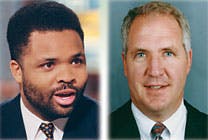to resolve severe medical lab personnel shortage
The United States faces a severe, problematic shortage of qualified laboratory personnel. Many rural areas and smaller hospitals find recruiting and retaining qualified laboratory personnel more and more troublesome. according to the American Society for Clinical Pathology, half of all laboratories report difficulties hiring new testing personnel. Because of our concern for our nations abilities to meet laboratory testing needs, we have introduced the Medical Laboratory Personnel Shortage Act.
The U.S. Department of Labor projects that 13,200 medical laboratory professionals will be needed yearly through 2010. Unfortunately, fewer than 5,000 graduate from accredited training programs each year. Another concern is the average age 43.7 of the laboratory workforce, which has been rising steadily. The pace with which younger, newly trained laboratorians have entered the workforce has not kept pace with retirements. An aging workforce can be more vulnerable to the adverse health and safety risks associated with shift work. Naturally, as our nation ages, the demand for laboratory testing services will escalate.
Our nations capacity to train new testing personnel has declined substantially. According to the National Accrediting Agency for Clinical Laboratory Sciences, school closings in the last five years have reduced the number of training programs by 30%. Besides reducing our ability to train new laboratorians quickly, the impact on rural areas, where prospective lab practitioners often seek training close to home is profound. The decline in training programs has also affected our larger cities; Los Angeles and Miami have no accredited clinical training programs for medical technologists (MTs) or medical laboratory technicians
(MLTs).
Personnel turnover is also a growing problem. With competition for lab personnel intensifying, turnover rates for some categories exceed 20%. Because of the difficulty in finding qualified staff, medical laboratories are often turning to temporary staff to handle the patient-testing workload.
The vital role medical laboratory professionals play in healthcare must be recognized 70% to 75% of all medical diagnoses are based on lab test results. Ensuring that our nations laboratories possess the human resources to accurately process testing demands is critical to patient health.
So, how does the Medical Laboratory Personnel Shortage Act HR 623 address these problems? It modifies a number of existing federal programs and focuses them on the medical laboratory personnel shortage. It expands opportunities within the Scholarship for Disadvantaged Students program for MTs and
MLTs.
The bill includes a scholarship program to help students meet their academic education and clinical training expenses. It provides for loan forgiveness for MT/MLT graduates by letting them work in designated areas with a shortage of medical laboratory personnel or allied health practitioners. The measure creates a program specifically targeted at augmenting the number of cytotechnologists working today.
To further develop our nations laboratory workforce and capacity to train aspiring lab professionals, this legislation includes a program to provide awards to individuals who teach medical laboratory science. The bill also allows schools of allied health, as well as healthcare institution-based programs training medical laboratory personnel, to receive federal funding. The measure authorizes funding upward of $120 million for the 2004 fiscal year. Included is $100 million for the Title VII allied health and other disciplines program for fiscal year 2004 and a preference toward programs that will expand the number of individuals trained as medical laboratory personnel.
Getting the HR 623 signed into law will require hard work, both on our part and on the part of the laboratory community. The bill now has 16 co-sponsors; more support will improve the bills chances of being enacted. We urge those interested in seeing the bill signed into law to contact their elected representatives by letter or by phone. Tell them how the personnel shortage has affected you and your laboratory, and ask them to co-sponsor the legislation. You can obtain your legislators addresses and phone numbers by calling the Congressional operator at (202) 225-3121.
Given that Jobs Rated Almanac has ranked MT and MLT jobs, 16 and 18, respectively, out of 250 of the best careers, we hope HR 623 will encourage more individuals to pursue rewarding ones in the medical laboratory. Your advocacy for this legislation will make our shared goal of reversing the laboratory personnel shortage much more obtainable.
Rep. Jesse L. Jackson, Jr., (D-IL), serves on the House Appropriations Committee. Rep. John Shimkus (R-IL) serves on the House Energy and Commerce Committee.
January
2004: Vol. 36, No. 1©
2004 Nelson Publishing, Inc. All rights reserved.


